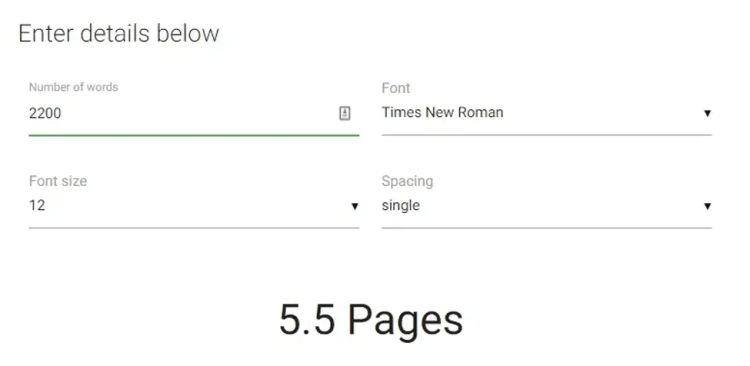It’ll take you roughly 10 minutes if you read this entire article. However, it took me around 20 times longer to write it. When you take a moment to think about it, well-made long-form content takes a lot of time to generate. I mean, very few people can sit down and bust out a 2,000-word article in an hour and move on with their day. For most of us, it takes 2-3 hours to create a solid piece of content in the neighborhood of 2,000 words. So, you’re likely wondering two things: 1.) Does the length of your content really matter? 2.) Is it worth the time and effort?
I mean, given the time and effort that long-form content requires, you’d hope that it’s worthwhile. I know, that’s a wicked depressing thought to consider. So, here’s what I’m going to do. I’m going to share my thoughts on whether the length of your content matters – no pulling back and without hesitation.
Next, I’m going to provide you with an idiot-proof formula to avoid wasting your time when you write content. Mind you, this article isn’t meant for isn’t a walk in the park. It wasn’t easy to write and it might be difficult to read…don’t say I didn’t warn you!
If you’re ready to stop wasting your time, start ranking at the top of the SERPs and take your content marketing efforts to the next level, then we best get going.
How Long Does It Take to Write a Long-Form Article?
I’m not a huge fan of math, but it does serve a purpose, so humor me here.
Let’s say you write a 2,200-word article – the average length of my articles – with an average typing speed of 40 words per minute. That amounts to 55 minutes if you type without stopping.
Obviously, that’ snot how it works.
You’re not just writing a bunch of words! You’re writing a well-crafted and well-researched article!
According to Wordstopages.com, a 2,200-word article is around 5.5 pages if you use the standard Times New Roman font.

The overall page count drops by more than half a page if you swap Times New Roman out for the more progressive Arial font.

Anyways, a carefully crafted, five-page article requires exponentially more time.
According to Estipaper, a 5.5-page article will take about 7.5 hours to write. Seeing how the average person is only productive for 3 hours per day, a 5.5-page paper will take more than two full days to complete.
Naturally, there are a small handful of writers who can produce content at a far faster rate. Their “secret” is using a combo of raw skill, serious focus, and a familiarity with the subject matter.
Are You Wasting Your Time If You Write Really Long Articles
Possibly. I’ll explain why in a moment.
Naturally, it depends on a number of factors. Two of the major contributing factors are that 1.) no two articles are the same, and 2.) no two writers are the same.
In order to figure out if you’re wasting your time, you need to understand the purpose of your article.
What is the goal?
- At a high level, you want to make money
- Get a little closer and you probably want to get a lot of the right kind of traffic
- An even closer inspection reveals that you want to rank high for relevant keywords
Asking how long it takes to write an article is a great question, but we also have to understand the end goal.
If you’re spewing out 2,000 words without the right focus, then you’re definitely wasting your time.
You’ve probably heard people explain how important it is to write long-form content. So you respond by writing really long articles and expect your crazy long articles to rank high based solely on length.
Sadly, that’s not how things work.
Here’s why.
Google Doesn’t Care About Word Count
Let’s pull the curtain back on a surprising truth about Google’s algorithm, search results, and the length of your content.
There is no data proving that a high word count yields higher rankings. Instead, we can show that larger word counts correlate with higher rankings. This is why I’m a HUGE fan of long-form content.
You’ve likely seen this data before, but it’s worth sharing again.
Longer content typically yields more backlinks:

Longer content typically produces more social shares:

Lastly, and possibly most importantly, longer content reels in more organic traffic:

Longer content also typically has a higher social engagement rate (y-axis shows engagement metrics):

To top it all off, longer content frequently earns higher SERP rankings!

Most SEO professionals see this information and think to themselves, “I need to write more!”
So, as we discussed earlier, they work long and hard hours to generate more content.
This is where I caution you against wasting your time…
You can’t expect to simply write more content and get all the good stuff – higher rankings, more backlinks, increased social sharing, and enhanced social engagement.
Instead, you need to write higher-quality content.
Yes, “better” content is often longer, but not always. Think of it this way, all Muppets are puppets, but not all puppets are Muppets!

It’s more than just length. In fact, the real reason for high-ranking content isn’t the length at all. For example, let’s take a look at the top-ranked organic result for “content marketing.”
The top result when I searched for “content marketing” on this chilly April morning was an article titled “What is Content Marketing?” from the Content Marketing Institute blog.

The entire page, including footer text and menu items, has only 1,120 words – the article itself is only 647 words long!
This is a single example of a major search term. According to Ubersuggest, “content marketing” has an SEO difficulty of 84. A search term of this difficulty requires 9,058 backlinks and domain authority of 85 to rank in the top 10 on Google’s SERP.

Furthermore, there is an absurd search volume for “content marketing.”

So, what about longtail keywords, such as “B2B content marketing strategy.”
For a longtail query like “B2B content marketing strategy,” we would expect to see in-depth articles that are filled with valuable information.
As expected, Google delivers results that coincide with our expectations.
The first organic result contains 3,980 words. This post is double the 1,500 benchmark and nearly 2,000 words longer than the 2,000+ that I normally aim to hit.
The second organic result is a post from Backlinko. This article is another beast of a post containing 2,739 words, which surpasses the 1,500 benchmark and my personal target of 2,000.
Next up, we have a post from Cience.com, which consists of 1,961 words. While this post exceeds the 1,500 benchmarks, it doesn’t fulfill my 2,000-word count standard.
So, what’s going on here? Am I handpicking examples to prove a point?
No. I opted for “content marketing” keywords to produce results from the content marketing community – writers and content creators who believe that longer is better.
While the first two results that Google serves up are rather lengthy, the third one breaks the trend and shows that top-ranking content doesn’t have to be super long.
Now I could easily find a long-form article for every short article.
However, the point I’m trying to get at here is that just because you write long content doesn’t mean that you’ll rank higher.
Let me repeat that for those in the back. The real reason why content ranks high has little to do with the length.
So…if the length of your content doesn’t dictate rankings, then what does?
Every Piece of Content You Generate Needs to Have These Three Traits

Content length isn’t the deciding factor.
While important, there are other factors that carry more weight in terms of how Google will rank your content on its SERPs.
So….what kind of factors do influence high-ranking content?
Naturally, this is the entire question that SEO and content marketing attempt to answer.
There are three clears answers that are backed with data.
1.0 Content Needs to be Deep
What do I mean by “deep?”
“Deep” content covers as many relevant topics as possible. If you’re writing about “dog food,” then you want to generate content that discusses types of dogs and other relevant dog topics.
In most cases, deep content is long by necessity. In order to touch on as many relevant topics as possible, you have to write more words.
2.) Content Should Have Comprehensive Coverage
Content that ranks high will have comprehensive coverage. Comprehensiveness refers to the variety of related topics that the article touches on. For example, deep content aims to provide lots of relevant topics, whereas comprehensive content strives to provide more mentions of related topics.
3.) Content Should Focus on the Topic (Keyword) for Which You Want to Rank
In case you weren’t aware, keyword stuffing is a thing of the past…Google will actually punish you for it.
However, focusing on a single topic and mentioning it numerous times is hip and trendy today. When you analyze the top result for a given keyword, you’ll find that the selected keyword appears multiple times in various forms within the content.
Proper planning helps you avoid keyword stuffing and ensures that you include longtail keywords that can deliver additional traffic to your site.
Closing Thoughts
- There is no law stating that your content must be a certain length in order to rank high.
- Most content marketers spend a lot of time creating their content – this is a good thing!
- Data suggests that your content needs to exhibit three characteristics:
- Depth
- Comprehensive Coverage
- Focused on the topic (keyword) for which you want to rank
When you generate content with those three characteristics, you may find yourself writing a 4,000-word post, or it might only be 1,000-words. Either way, it’s going to be a well-developed post. And that’s what Google loves!





